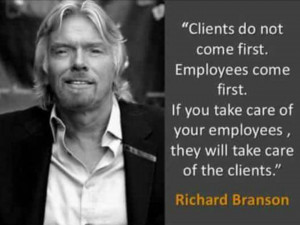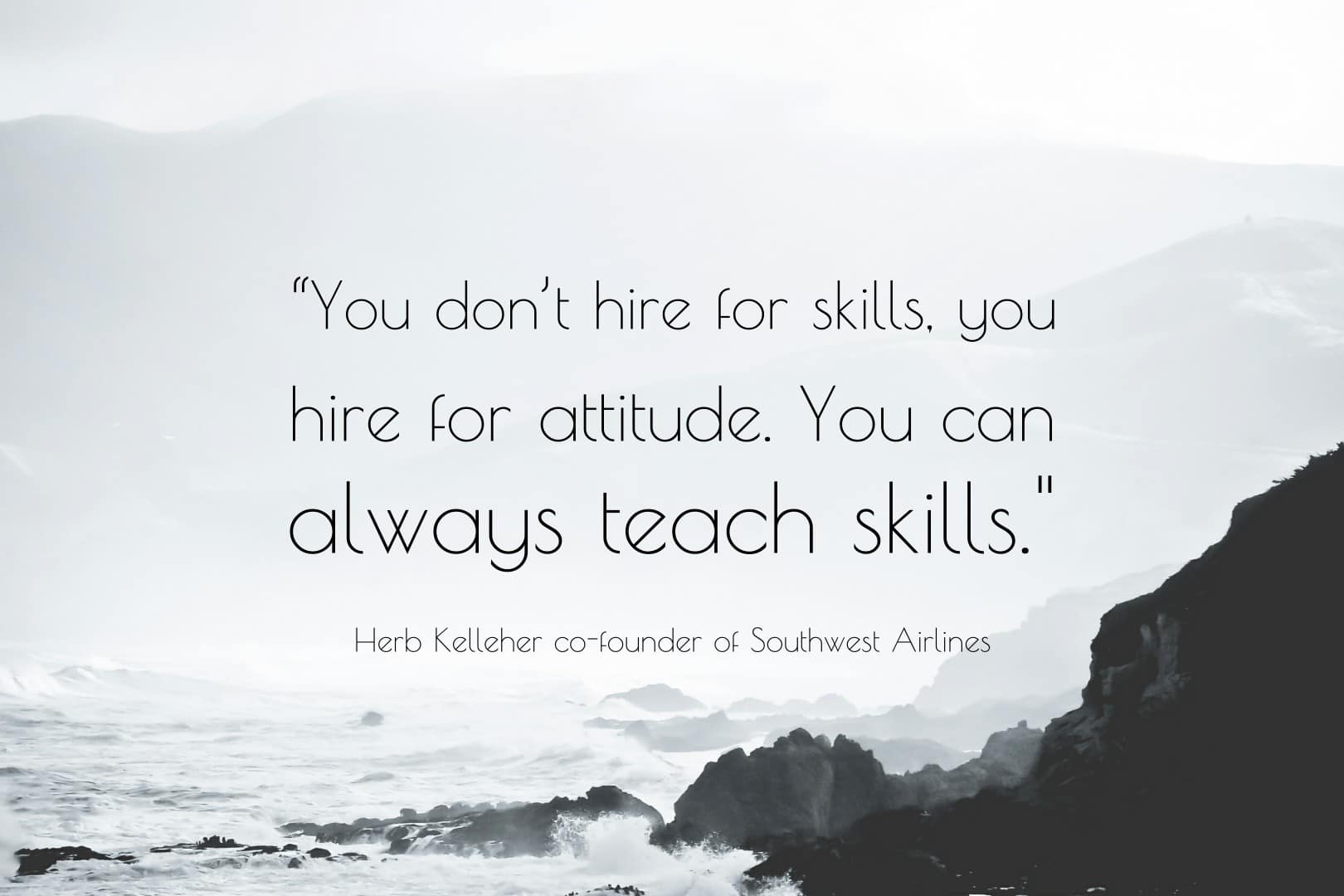Do you trust them?
We’re talking about Front Line Employees.
So Ignored, Yet So Valuable.
“You don’t hire for skills, you hire for attitude. You can always teach skills.”
–Herb Kelleher co-founder Southwest Airlines
Did you ever think your front line employees actually are responsible for your company’s reputation in the market?
So who are front line employees? Why do they hold so much of your company’s reputation in the palm of their hands?
Your Front Line Employees are the people in your company who answer the phone or help customers in person. They are the first person in contact with your customer and they have a strong impact on the customer experience and influence the public’s perception of your company.
These front line people should be delicately selected and carefully trained in the art of creating a positive customer experience.
Now I know you’ve heard the saying the customer comes first. Well yes and no. There may be some truth to that, however there is a freakish idea that employees come first and customers run a close second.
Why?

So employees come first?
“Not in my business, if it wasn’t for my customers I would be nothing,” you might be saying to yourself.
And you’re right, but who is responsible for your customers?
Screen your front line job applicants for dominant people skills, have they worked with customers before? In the interview process, be attentive to their social skills, give them a few examples of some problems that might occur and ask how they would best handle it, like an angry or complaining customer. Check with their former employer, has there been any complaints? Ask the former employer what is their best quality?
Maybe invest in some training.
But don’t just hire anyone to deal directly with your customers, remember these front line employees have your company’s reputation in the palm of their hands.
The people on the inside walls of your business are many times a reason why your business will thrive and survive or fail.
I also don’t think it would be a bad idea to offer more money per hour for excellent front line employees, or to offer bonus pay for excellent service. A gift card just to show your appreciation would go far. Trust me when I say this, it’s a great investment.
However, it’s all too common to find rude and disagreeable people in front line positions whose only talent is to piss off customers. If you have sour and troublesome employees at your company then either get rid of them or place them in a job where they don’t deal directly with customers. If they have talents that can be used elsewhere in the company, that’s wonderful, otherwise tell them to get lost. (In a nice way)
But, keeping rude employees on the front line is economic suicide to your business and it’s unfair to the rest of your employees who are working hard to please your customers.
However a word of caution here: If you do find a number of employees on occasion being rude to customers the problem may be contact overload…the best employees often times feel burned out to over exposure to too many customers all at one time or over worked employees during times of heavy shopping days like Christmas. If you have an extreme amount of customers coming into your stores at any given time, maybe hiring additional help would solve the problem.
As for training, the best customer experience training is intensive and an on-going part of every employees job. Shallow one day programs telling employees to smile more and act warm and fuzzy might amuse and entertain employees for a day or two, but they’re not likely able to produce much enduring benefit.
If your front line people need to be trained to be nice, then most likely they don’t have the social aptitude to be on the front line in the first place.
The operating model of most stores is focused on creating emotional and/or economic pressure to drive performance. District managers often hear, “You need to get your team to try harder,” or “This is really not what we would expect from your store,” or they would use threats, “Other stores are doing better. So let’s get with the program or else.” On occasion, managers would use special rewards or threats to motivate better performance.
And this is not the way to operate your business.
Good training arms your front line employees with additional skills needed to make your company win the heart of the customer. A basic understanding of what it takes to win customers can really help them understand what to do when a customer’s attitude turns ugly. Additional information could be taught like how to turn a complaining customer into a return customer along with ideas and techniques on identifying problems and solutions to solve those problems.
Another great idea is to create a self-taught program where employees attend and come up with ideas on their own to how they can solve problems. They can share their own stories and experiences and help one another to come up with better ways to communicate and solve crucial problems before they get out of hand.
Anticipating problems or solving problems before they occur is a great way to keep your business running to full efficiency and problem free.
Make these employee meetings voluntary, informal and most of all fun. You can maybe serve refreshments, buy pizza and pass out gift cards. It’s important to hold the meetings on company time so your employees can feel fully engaged. Remember: the people closest to the job have the best ideas on improving it.
Are you listening to them?
Are you even asking them?
Give your front line employees the power to help solve problems and take responsibility.
Below are some real life customer complaints. They are so basic in form but are the most violated by employees. Keep in mind, the most common problems can lose you customers.
Customer Complaint:
“All the sales people ignored me, not even a single hello, I guess they’re too busy for me.”
As soon as you see a customer, politely acknowledge their presence. Even a quick hello, followed by a thank you for coming in, we’ll be right with you. Never, never, never, ever ignore a customer.
Customer Complaint:
“That person was so rude, they nearly hung up on me.”
“I was on hold for the longest time.”
Be equally prompt and polite when answering the telephone is important. Many customers will decide not to visit a store based just on the experience they had over the phone with one of your employees.
Customer Complaint:
“When I got there my sales person was at lunch…I thought we had an appointment.”
If a customer has a scheduled appointment, make it your business to be present and on time. This happens a lot in the car business.
Customer Complaint:
“The sales associate didn’t seem to understand my situation, whenever I would ask a question, he just didn’t know how to answer me.”
Prepare for customer questions by having answers ready before they ask. This will take some study on the part of your employees but product knowledge is important.
Customer Complaint:
“They keep telling me there’s nothing they can do, it’s their policy. I don’t care about their policy.”
Listen to the customers needs and/or problem and match the best customize solutions with their problems. “It’s our policy” is death to your store’s reputation and are fighting words to a angry customer. A customize solutions approach is more tailored to individual problems and concerns. A more customized policy is best.
Finally…
What to Do When the Customer is Angry or Defensive:
Whenever you encounter an angry or defensive customer you have the opportunity to really show off what you’re made of. You can react defensively or helpfully. Over-reacting to angry people with a defensive attitude is only asking for more abuse.
Reward with Kindness, Empathy, and Solutions:
The problem of an irate customer is actually two problems in one. First, you have to deal with the customer’s combustible feelings. Then you have to try as best you can to solve the problem that made him/her mad in the first place.
If you simply solve the problem without making an effort to soothe his/her anger, the customer probably won’t be back.
Remember, people come back to buy where they feel good. So the next time you encounter an angry customer, keep these ideas in mind and put them to work.
- Keep your cool.
- Listen with empathy and listen for the facts.
- Keep your mind focused on the solution to the problem, not their anger.
- Take action to solve the customer’s problem immediately. (Customer’s love action)
- Bring the incident to a polite close. (Thank them for bringing this to your attention)
- Don’t expect to win them all. (Because you won’t)
What to Do When the Customer Has Special Requests:
Every customer is an individual person having special wants and needs. And the better you meet those unique wants and needs, the greater the odds of winning and keeping customers.
Thanks to digital technology, successful businesses are moving away from mass marketing and replacing it with mass customization. Simply put, this means that the era of one-size-fits-all products and services is being supplanted with one-to-one marketing where each individual customer gets a product or service custom tailored to his or her specific and unique wants.
- Six Ways to Differentiate Your Company and Win Over Your Competition. - April 22, 2021
- The Real Way To Build Your Business - April 5, 2021
- To Question Your Integrity? How To Handle Criticism From The Tough Client. - October 22, 2020

